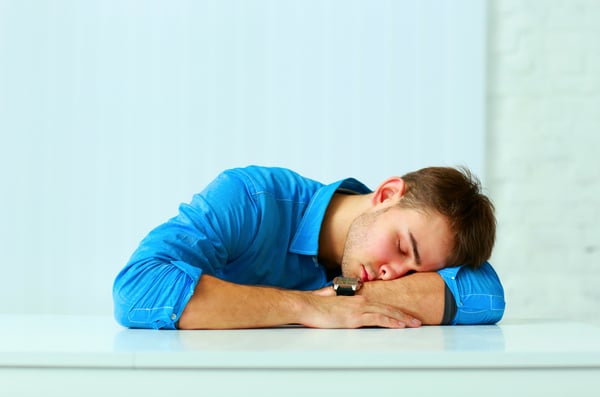Sleeping too much : Is It a Real Problem?
Published on: August 12, 2025 | Reading time: 🕐 3m

What is Hypersomnia?
Can you really sleep too much? Many people suffering from insomnia would laugh at the question: “Too much sleep? Ha! What a good joke!” And yet, as with many things, excess can be just as problematic as deficiency. Yes, it is possible to oversleep. Sleeping more than nine or ten hours a night and still feeling tired and drowsy upon waking may be the sign of a real but little-known condition: hypersomnia.
There are two main types of hypersomnia: primary and secondary. The difference lies mainly in their cause. In both cases, however, hypersomnia manifests as hypersomnolence, excessive daytime sleepiness (EDS), defined as an abnormal tendency to fall asleep in inappropriate situations or an irresistible need to sleep during the day, distinct from simple fatigue.
In primary hypersomnia, this excess sleep is the main disorder. There are three main forms:
- Narcolepsy (Type 1 and Type 2), a chronic neurological disorder that disrupts the normal regulation of the sleep-wake cycle. Type 1 narcolepsy is characterized by episodes of cataplexy, a sudden loss of muscle tone, and is often associated with the loss of neurons producing hypocretin (a neuropeptide regulating wakefulness). Type 2 narcolepsy, on the other hand, usually does not include cataplexy.
- Kleine-Levin Syndrome, an extremely rare neurological condition marked by prolonged episodes of sleep, along with cognitive and behavioral disturbances.
- Idiopathic Hypersomnia, the cause remains unknown, but it is characterized by an excessive need for sleep even after a full night’s rest, great difficulty waking up, and non-restorative naps.
Secondary hypersomnia, by contrast, is a symptom or side effect of another health condition or an identifiable cause. It may stem from various sleep disorders (such as obstructive sleep apnea), mental health issues (like depression), certain illnesses (including encephalitis or some degenerative diseases), inadequate sleep habits, or the use of certain medications.
The Impact of Hypersomnia on Daily Life
Whether primary or secondary, hypersomnia can have a major effect on quality of life. Feeling constantly exhausted despite a full night’s sleep creates a deep mismatch between the body’s needs and daily demands. This mismatch can have repercussions in several areas: at work, at school, and in family or social life. In professional or academic contexts, excessive daytime sleepiness can lead to reduced concentration, memory lapses, and even involuntary sleep episodes. This can affect performance, increase the risk of mistakes, and even pose real danger, particularly when driving or operating machinery. Socially, the persistent feeling of exhaustion can cause irritability, withdrawal, or a lack of interest in interacting with others. These mood and behavior changes can harm relationships and disrupt social functioning in daily life.
Treatment Options
If you believe you’re getting enough sleep but still feel exhausted during the day, it may be worth consulting a healthcare professional. An assessment can help clarify your situation and identify possible causes of your daytime sleepiness. In some cases, improving sleep hygiene, such as maintaining a regular sleep schedule and reducing evening stimulation, can already make a difference. If hypersomnia is primary, wake-promoting medications may be prescribed to help manage daytime sleepiness. At the same time, complementary approaches such as cognitive-behavioral therapy can be beneficial, particularly when hypersomnia is linked to secondary factors such as anxiety, stress, or poor sleep habits.
References
- Leu-Semenescu, S. (2022). Sommeil et maladies neurodégénératives. Médecine Du Sommeil, 19(4), 253-287. https://doi.org/10.1016/j.msom.2022.10.004
- Bollu, P. C., Manjamalai, S., Thakkar, M., & Sahota, P. (2018). Hypersomnia. Missouri medicine, 115(1), 85–91.
- Trotti L. M. (2017). Idiopathic Hypersomnia. Sleep medicine clinics, 12(3), 331–344. https://doi.org/10.1016/j.jsmc.2017.03.009
Need help with your sleep?
We can help you! HALEO offers a solution that can contribute to productivity and well-being through quality sleep. Schedule a discovery meeting by booking your time here.




